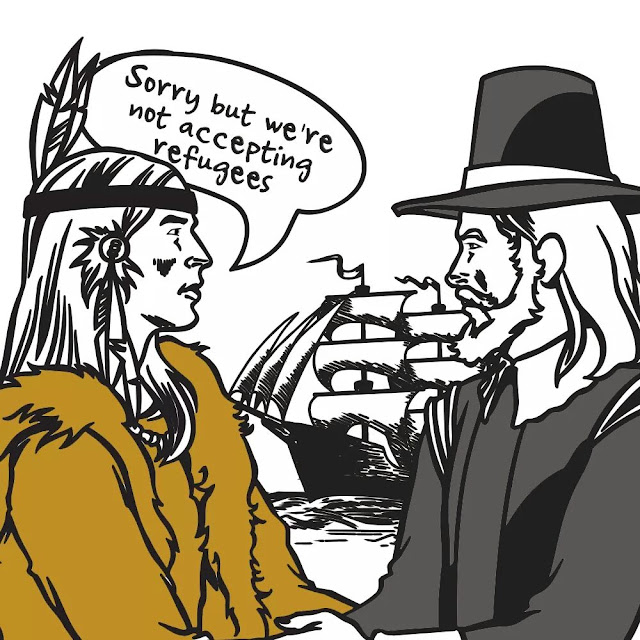If you have nothing else to be thankful for on this day, be thankful that you are not a refugee - political refugee, war refugee, climate refugee, whatever. I fully understand that some migrants are economic opportunists seeking to game the system, but the vast majority are helpless victims of circumstances beyond their control - from wildfires, floods, droughts, ethnic cleansing, national geopolitical policies, and wars.
The top embedded image is from the border between Poland and Belarus, where the migrants are political pawns in an autocrat's power struggle with the EU. They have been displaced from their homes, have only what they can carry, lack food and shelter and are facing an oncoming winter entirely at the mercy of strangers.
Here's an old photo of a Syrian refugee child:
“I was using a telephoto lens, and she thought it was a weapon,” photographer Osman Sağırlı told the BBC. “İ realized she was terrified after I took it, and looked at the picture, because she bit her lips and raised her hands. Normally kids run away, hide their faces or smile when they see a camera.”
It's tempting to succumb to "compassion fatigue" when reading about the never-ending world crises, or to consider oneself safe from geopolitical conflicts, ignoring the potential of becoming a climate refugee.
Reposted from 2021 to add a WTF development:
Foreigners seeking visas to live in the U.S. might be rejected if they have certain medical conditions, including diabetes or obesity, under a Thursday directive from the Trump administration.While assessing the health of potential immigrants has been part of the visa application process for years, including screening for communicable diseases like tuberculosis and obtaining vaccine history, experts said the new guidelines greatly expand the list of medical conditions to be considered and give visa officers more power to make decisions about immigration based on an applicant’s health status.
We (and other countries) have always in modern times screened immigration applicants for health status - especially communicable diseases - which is why Ellis Island exists. But extending those guidelines to chronic or potential disorders gives the immigration office a new method to exclude persons for unexpressed criteria, such as religion and race.



Happy Thanksgiving, Stan ~ I am thankful for you and your awesome blog!
ReplyDeleteThe cartoon feels like its message is at odds with the post's. The intended effect is for the reader to empathize with the white pilgrims and therefore reevaluate their attitudes toward current refugees. But, taking the cartoon another way, had the American Indians actually had such a policy there would be a LOT more of them alive today.
ReplyDeleteHa, good point about how there might be more Native Americans today if they hadn't allowed the migrants in.
DeleteThe way I read the cartoon is neither of those two ways - it's "what a bunch of hypocrites today's Americans are, they were all immigrants to begin with".
Another layer: Imagine a cartoon featuring all the mega fauna species erased, as the first Homo sapiens arrived in North America. "Sorry but we're not accepting any ecocidal apex predators."
ReplyDeleteIt reminds me of the song /I Couldn't Help It, I Was Only Hungry/, by Astrid Lundberg. Here, if a link is allowed: https://www.youtube.com/watch?v=g_Zrry2_9YA
DeleteLInks are not only allowed, but encouraged (I review them all before ok'ing the comment).
DeleteComplicating matters: https://www.pnas.org/content/117/46/28555
ReplyDeleteWhite Boy summer 1620 ... my family dates back to the late 1600s on this continent ... and I for one am very grateful ... and there is nothing anyone can do about
ReplyDeleteIt should be noted that in one of the wealthiest nations in world history, most Americans can find homeless people within a few miles of where they live. Roughly a million US citizens live this most torturous version of destitution. I stood with these people, very publicly, for many years, and it's my impression that 99.9% of liberal Americans care far more about immigrants than they do about the poorest Americans. I've long pondered why this is the case.
ReplyDeleteThat's your impression, not a fact. You can invent whatever narrative you want based on what you claim to have seen. I know plenty of liberals who care about the homeless and work to help them. If that doesn't fit your experience maybe you're not looking.
DeleteBecause many liberals here still buy into free-market capitalism and have the belief that everybody born in the US, unless a minority, has the same opportunities. You just need to get off your ass and go to work. Any doubt? Go into the Department of Human Assistance and ask to apply as a white male. The looks you get will blow away any doubt.
ReplyDelete